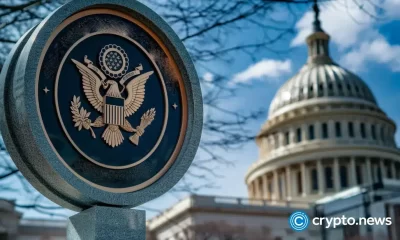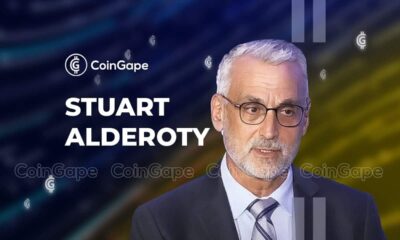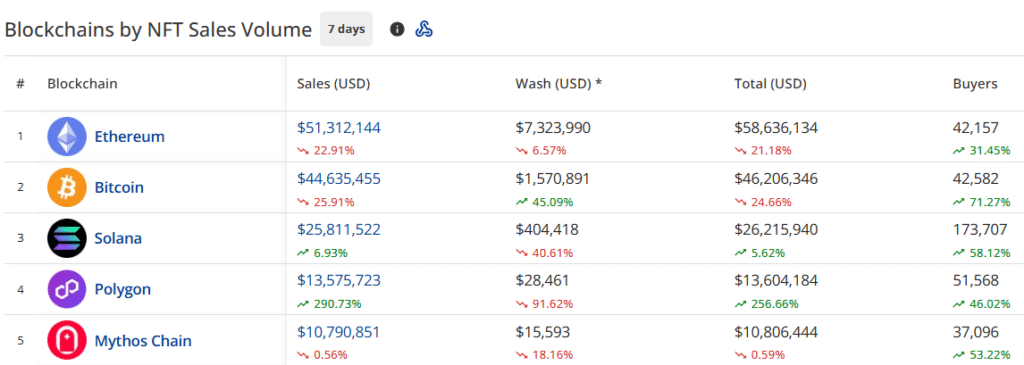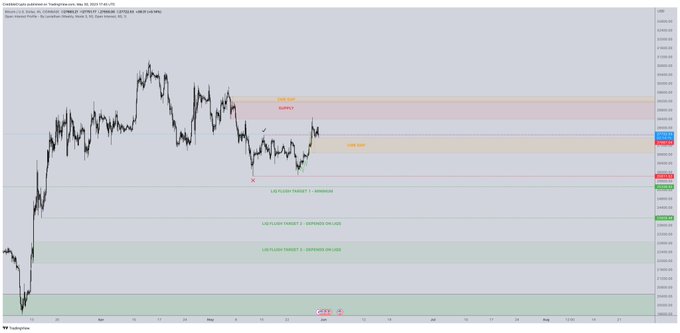Bitcoin
Jamie Dimon from JPMorgan eyed by Trump for Treasury
Published
4 months agoon
By
admin

Will Trump’s potential choice of Jamie Dimon, a vocal critic of Bitcoin who said he’d close it down, mark the beginning of the end for cryptocurrency freedom in the U.S.?
Former U.S. President and current Republican nominee Donald Trump, a man known for his bold and often controversial decisions, recently dropped another bombshell.
In an interview with Bloomberg, conducted in late June and published on July 16, Trump revealed that he is considering JPMorgan CEO Jamie Dimon for a key position in his cabinet if he wins the upcoming election. The role in question? Secretary of the Treasury.
Now, here’s where it gets interesting. Jamie Dimon, a name synonymous with JPMorgan Chase, has been one of the harshest critics of Bitcoin (BTC) and crypto.
Over the years, Dimon has not minced words, calling Bitcoin a “fraud” and warning investors to stay away from the volatile crypto market.
However, in the same interview, Trump hinted that Dimon might have had a change of heart. He referenced a recent meeting in June where he met with Dimon, top executives, and Republican lawmakers, and Trump showed ‘a lot of respect’ for him.”
This isn’t the first time Dimon’s name has surfaced in connection with a high-profile government role. Back in 2016, during Trump’s first term, Dimon was offered a position in the Treasury but ultimately turned it down.
Fast forward to December 2023, and whispers of Dimon heading the Treasury resurfaced, with reports emerging of the possibility based on sources close to Trump’s campaign.
Let’s dive deeper into who Jamie Dimon is, his past remarks on crypto, and what his potential appointment could mean for the future of Bitcoin and the broader crypto market.
Meet Jamie Dimon
Jamie Dimon is a big name in the banking world, known for his no-nonsense approach and strong leadership. Born in 1956, Dimon graduated from Tufts University with a degree in psychology and economics and earned his MBA from Harvard Business School.
Dimon’s career started at American Express, where he worked under Sandy Weill. He then moved to Commercial Credit and later Citigroup, following Weill, where he played a crucial role in building one of the largest financial services companies in the world.
In 2004, he joined Bank One, which was later acquired by JPMorgan Chase. By 2006, Dimon became the CEO of JPMorgan Chase, leading it to become one of the most influential banks globally.
Dimon is known for his straightforward and sometimes controversial statements. In 2012, he downplayed a major trading loss, calling it a “tempest in a teapot,” which drew stark backlash.
He’s also a vocal critic of regulators and has often sparred with them over financial rules.
But, he is also one of the staunchest critics of crypto and has made several remarks over the years. He has called Bitcoin a “fraud” and warned investors against it, predicting its eventual downfall.
Despite this, rumors of him softening his view have emerged, particularly with Trump considering him for the Treasury.
Dimon and crypto: a complicated relationship
Dimon has never been shy about expressing his disdain for Bitcoin and crypto. His most recent and striking criticism came in April 2024 during an interview with Bloomberg TV, where he labeled Bitcoin a “fraud” and a “Ponzi scheme.”
Dimon stated, “Crypto, if you mean crypto like Bitcoin, I’ve always said it’s a fraud. If they think there is a currency, there’s no hope for it. It’s a Ponzi scheme, it is a public decentralized Ponzi scheme.”
Dimon’s negative stance on crypto was reiterated just a few months earlier, in December 2023, during a Senate hearing. When questioned by Massachusetts Senator Elizabeth Warren, Dimon didn’t hold back.
“I’ve always been deeply opposed to crypto, Bitcoin, etc.,” he declared, arguing that crypto primarily serves criminals, drug traffickers, money launderers, and those avoiding taxes. Dimon even went as far as to say, “If I was the government, I’d close it down.”
This stance isn’t new for Dimon. He has been vocal about his negative views on Bitcoin and other crypto since at least 2014. In an interview with CNBC in 2014, Dimon criticized Bitcoin as a terrible store of value, arguing that it could be easily replicated and lacked the legitimacy of government-backed currencies.
He said, “It’s a terrible store of value; it can be replicated over and over. It doesn’t have the standing of a government.”
Another one of his infamous critiques came in September 2017 when he labeled Bitcoin a “fraud” and compared it to the infamous Tulip Mania bubble of the 17th century.
Dimon said, “I’d fire them in a second,” referring to any JPMorgan trader caught trading Bitcoin. He reasoned this decision with, “For two reasons: It’s against our rules, and they’re stupid. And both are dangerous.”
Interestingly, while Dimon has been a staunch opponent of Bitcoin, he has shown some support for the technology behind it — blockchain.
In October 2017, just days before JPMorgan launched its blockchain initiative for interbank payments, Dimon acknowledged the potential of blockchain technology.
“The blockchain is a good technology. We actually use it. It will be useful in a lot of different things. God bless the blockchain,” he said.
Despite his harsh words about crypto, Dimon admitted, “I could care less about Bitcoin. I don’t know why I said anything about it.”
So, what does Dimon’s potential role as Treasury Secretary mean for the crypto market, and might his views influence U.S. financial policy?
What lies ahead?
If Trump returns to power and appoints Dimon as Secretary of the Treasury, the future of crypto in the U.S. could face significant changes.
Dimon’s track record as a banker is impressive. Under his leadership, JPMorgan Chase not only survived the 2008 financial crisis but emerged stronger. His firm stance on regulatory compliance and financial stability has made him a respected figure in traditional finance.
However, this same mindset could spell trouble for the crypto industry. Dimon’s past remarks, labeling Bitcoin a “fraud” and a “Ponzi scheme,” suggest that he could push for stricter regulations and oversight, potentially curbing the freedom that crypto currently enjoys.
Interestingly, this could create a conflict within Trump’s administration. Trump has recently positioned himself as a pro-crypto advocate, aiming to attract a growing number of young crypto investors.
Whatever the case may be, politics is a long and strategic game where thoughts, actions, and beliefs can change in the blink of an eye, with underlying motives often driven by gain.
As the election fever heats up, we will likely see more such headlines in the coming days, and crypto will remain an important topic of discussion.
Source link
You may like


Will Toncoin Price Hit $10 After Recent 20% Rally?


AI Crypto Startup O.XYZ Faces Allegations of Misrepresentation and Internal Turmoil: Sources


Gensler to resign as SEC chair: What’s next under Trump?


Ripple Provided The Blueprint To Defeat Gary Gensler


Another U.S. SEC Democrat to Drop Out, Leaving Republicans Running Agency by February


Catzilla vs Cardano vs TRX for year-end success
Analyst
This Analyst Correctly Predicted The Bitcoin Price Jump To $99,000, But His Prediction Is Not Done
Published
10 hours agoon
November 23, 2024By
admin
A crypto analyst who accurately forecasted the Bitcoin price increase to the $99,000 All-Time High (ATH) has just released a more detailed analysis of his prediction. The analyst shared a chart highlighting crucial technical indicators and price movements that suggest the cryptocurrency could be gearing up for an even higher ATH.
Analyst Projects $105,000 As The Next Price Target
Weslad, a TradingView analyst, has raised his Bitcoin price forecast, predicting the next upside target at $105,764 as the crypto market bull run gains momentum. The analyst reported that BTC has officially entered the bull market phase, characterized by explosive price increases and positive market sentiment.
Related Reading
His recent bullish prediction of the Bitcoin price is grounded on a key technical pattern known as the “Ascending Channel,” which indicates a bullish trend continuation. This chart pattern consists of two upward-sloping trend lines drawn parallel to each other, representing the resistance and support price levels, respectively.
Despite his optimistic outlook for the BTC price, Weslad has revealed that investors should anticipate a corrective move toward the immediate buy-back zone, which would provide an optimal entry point for opportunistic buyers. The analyst has also shared a detailed price chart that highlights the bullish ascending channel and key price levels that Bitcoin could reach in the short-term and long-term.
Overview Of The Analyst’s Bitcoin Price Chart Analysis
In his 4-hour Bitcoin chart, Weslad visualizes the cryptocurrency’s price action within an ascending channel, highlighting that the BTC is moving upwards within two trendlines. The analyst has provided a detailed roadmap for his $105,764 bullish target for the Bitcoin price.
Weslad highlighted the price range between $91,000 and $92,000 as an “important demand zone,” which acts as strong support where buyers are likely to step in if BTC slips any further. He also revealed that the price level at $94,327.99 has been identified as an ”immediate buy-back zone,” which also serves as an optimal entry point if BTC experiences any corrective pullback in its price.
Related Reading
The analyst has also highlighted $97,537 as the “immediate profit target,” suggesting that traders may consider locking in profits at this critical short-term price level. He has also pinpointed the “mid-term target” for the Bitcoin price, highlighting that the $100,334 mid-term level is important for investors holding longer positions.
Lastly, Weslad has highlighted $105,764 as the “projected final target” for Bitcoin, indicating that this may be the ultimate target for the present market cycle. For BTC to reach this bullish price target, it would require only a modest 6.83% increase from its current value. As of writing, the price of Bitcoin is trading at $99,072, marking a 12.73% increase over the past seven days, according to CoinMarketCap.
Featured image created with Dall.E, chart from Tradingview.com
Source link
Bitcoin
NFT sales drop 9.6% to $160.9m, Ethereum and Bitcoin network sales plunge
Published
12 hours agoon
November 23, 2024By
admin
As Bitcoin surges toward the $100,000 mark, touching a new all-time high of $99,655.50, the non-fungible token (NFT) sales volume has shown a drop of 9.6% to $160.9 million.
The global cryptocurrency market capitalization has continued to surge, reaching $3.35 trillion from last week’s $3.03 trillion. This marks a 2% increase over the last day, with Bitcoin (BTC) currently trading at $98,620.
The last week’s NFT sales volume stood at $178.8 million. However, according to recent data from CryptoSlam, the NFT market has seen a pullback.
- NFT sales volume decreased to $160.9 million
- Ethereum (ETH) blockchain leads with $51.3 million in sales (23.07% decrease)
- Bitcoin follows with $44.6 million (25.67% decrease)
- NFT buyers surged by 52.93% to 450,512
- NFT sellers increased by 46.74% to 277,767
- NFT transactions slightly decreased by 1.26% to 1,606,261
Ethereum NFT sales decline by 23.07%
The Ethereum NFT blockchain sales volume fell to $51.3 million this week, marking a 23.07% decrease in the last seven days.
The number of NFT buyers on the Ethereum blockchain grew to 42,157, showing a 31.45% increase.

Bitcoin maintained its second position despite a 25.67% decrease in the last seven days.
According to the data, Bitcoin blockchain’s NFT volume stood at $44.63 million, with wash trading increasing by 46.05% to $1.57 million.
Solana (SOL) secured the third position with $25.8 million, showing resilience with a 6.83% increase during the last seven days.
Polygon (POL) jumped to fourth place with $13.5 million, displaying remarkable growth of 289.66% during the last seven days.
Mythos Chain (MYTH) took the fifth position with $10.7 million in sales, showing a marginal decline of 0.71%.
BRC-20 NFTs maintain market leadership
BRC-20 NFTs continue to lead with $16.6 million in sales volume, despite a 41.39% decrease.
MGGA Hat on Polygon secured second place with $10 million in sales, while CryptoPunks followed with $9.2 million, showing a 60.26% decrease.

The latest data shows that the following NFT collections topped the sales in the last week:
- Uncategorized Ordinals #016 sold for $3,795,420 (39.0083 BTC)
- CryptoPunks #7098 sold for $368,889 (118 ETH)
- CryptoPunks #6285 sold for $339,618 (100 ETH)
- CryptoPunks #3152 sold for $332,825 (98 ETH)
- Autoglyphs #210 sold for $279,868 (90 WETH)
Source link
Bitcoin
Trader Says Top-10 Altcoin To Vastly Outperform Bitcoin and Ethereum, Hit New Record High Quicker Than Expected
Published
14 hours agoon
November 23, 2024By
admin
A widely followed cryptocurrency analyst and trader is turning bullish on a large-cap altcoin that has more than doubled in price over the past two weeks.
The analyst pseudonymously known as Credible Crypto tells his 436,700 followers on the social media platform X that XRP is primed to reach a new all-time high a “lot quicker than most are expecting.”
“And I think it’s going to vastly outperform both Bitcoin and Ethereum from current levels while doing it.”
XRP is trading at $1.41 at time of writing, up by around 156% over the past two weeks.
Credible Crypto further says that XRP is on the cusp of entering the overbought zone of the Relative Strength Index (RSI) indicator on the monthly time frame. The RSI indicator, which is calibrated from 0 to 100, is used to determine overbought or oversold conditions, with levels between 70 to 100 indicating overbought conditions and levels between 0 to 30 indicating oversold conditions.
“This is bullish as f**k.
Contrary to popular belief, the higher RSI goes, the stronger the momentum is and the more bullish a coin is (absent bearish divergences) and like every other form of technical analysis the higher the time frame this is on, the more significant it is.
Next target is $2 and after that, we go for a new all-time high.”

According to the pseudonymous analyst, XRP also appears highly bullish in its Ethereum (ETH) pair and could be poised for triple-digit percentage gains against the second-largest crypto asset.
“XRP/ETH just reclaimed and retested a four-year-long range, with the first target being ~250% higher.”

Don’t Miss a Beat – Subscribe to get email alerts delivered directly to your inbox
Check Price Action
Follow us on X, Facebook and Telegram
Surf The Daily Hodl Mix
 

Disclaimer: Opinions expressed at The Daily Hodl are not investment advice. Investors should do their due diligence before making any high-risk investments in Bitcoin, cryptocurrency or digital assets. Please be advised that your transfers and trades are at your own risk, and any losses you may incur are your responsibility. The Daily Hodl does not recommend the buying or selling of any cryptocurrencies or digital assets, nor is The Daily Hodl an investment advisor. Please note that The Daily Hodl participates in affiliate marketing.
Generated Image: Midjourney
Source link

Will Toncoin Price Hit $10 After Recent 20% Rally?

AI Crypto Startup O.XYZ Faces Allegations of Misrepresentation and Internal Turmoil: Sources

Gensler to resign as SEC chair: What’s next under Trump?

Ripple Provided The Blueprint To Defeat Gary Gensler

Another U.S. SEC Democrat to Drop Out, Leaving Republicans Running Agency by February

Catzilla vs Cardano vs TRX for year-end success

Will Polkadot Price Continue To Rally Following 100% Surge?

Dogecoin, Shiba Inu set the trend; this altcoin is ready to take the spotlight next

This Analyst Correctly Predicted The Bitcoin Price Jump To $99,000, But His Prediction Is Not Done

Analyst Who Accurately Predicted Solana Price Rally Shares Next Target

NFT sales drop 9.6% to $160.9m, Ethereum and Bitcoin network sales plunge

SHIB Lead Shytoshi Kusama Hints At TREAT Token Launch

Trader Says Top-10 Altcoin To Vastly Outperform Bitcoin and Ethereum, Hit New Record High Quicker Than Expected

5 tokens to consider buying today

Terra Luna Classic Community Discord On Proposal Amid LUNC Price Rally
182267361726451435

Why Did Trump Change His Mind on Bitcoin?

Top Crypto News Headlines of The Week

New U.S. president must bring clarity to crypto regulation, analyst says

Ethereum, Solana touch key levels as Bitcoin spikes

Will XRP Price Defend $0.5 Support If SEC Decides to Appeal?

Bitcoin Open-Source Development Takes The Stage In Nashville

Bitcoin 20% Surge In 3 Weeks Teases Record-Breaking Potential

Ethereum Crash A Buying Opportunity? This Whale Thinks So

Shiba Inu Price Slips 4% as 3500% Burn Rate Surge Fails to Halt Correction

‘Hamster Kombat’ Airdrop Delayed as Pre-Market Trading for Telegram Game Expands

Washington financial watchdog warns of scam involving fake crypto ‘professors’

Citigroup Executive Steps Down To Explore Crypto
Mostbet Güvenilir Mi – Casino Bonus 2024

Bitcoin flashes indicator that often precedes higher prices: CryptoQuant
Trending

 2 months ago
2 months ago182267361726451435

 Donald Trump4 months ago
Donald Trump4 months agoWhy Did Trump Change His Mind on Bitcoin?

 24/7 Cryptocurrency News3 months ago
24/7 Cryptocurrency News3 months agoTop Crypto News Headlines of The Week

 News3 months ago
News3 months agoNew U.S. president must bring clarity to crypto regulation, analyst says

 Bitcoin4 months ago
Bitcoin4 months agoEthereum, Solana touch key levels as Bitcoin spikes

 Price analysis3 months ago
Price analysis3 months agoWill XRP Price Defend $0.5 Support If SEC Decides to Appeal?

 Opinion4 months ago
Opinion4 months agoBitcoin Open-Source Development Takes The Stage In Nashville

 Bitcoin4 months ago
Bitcoin4 months agoBitcoin 20% Surge In 3 Weeks Teases Record-Breaking Potential


